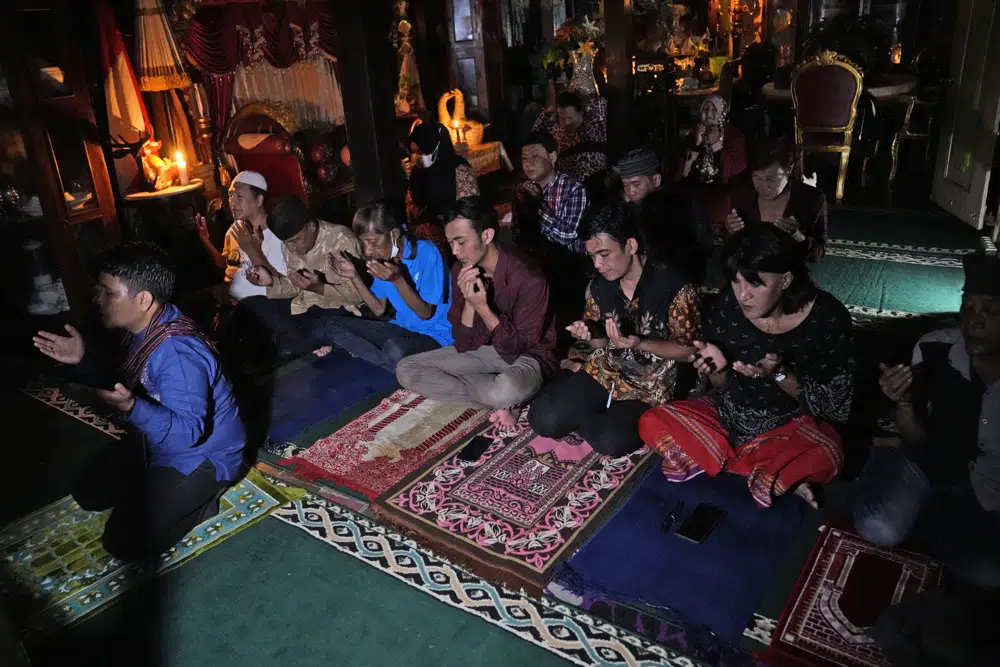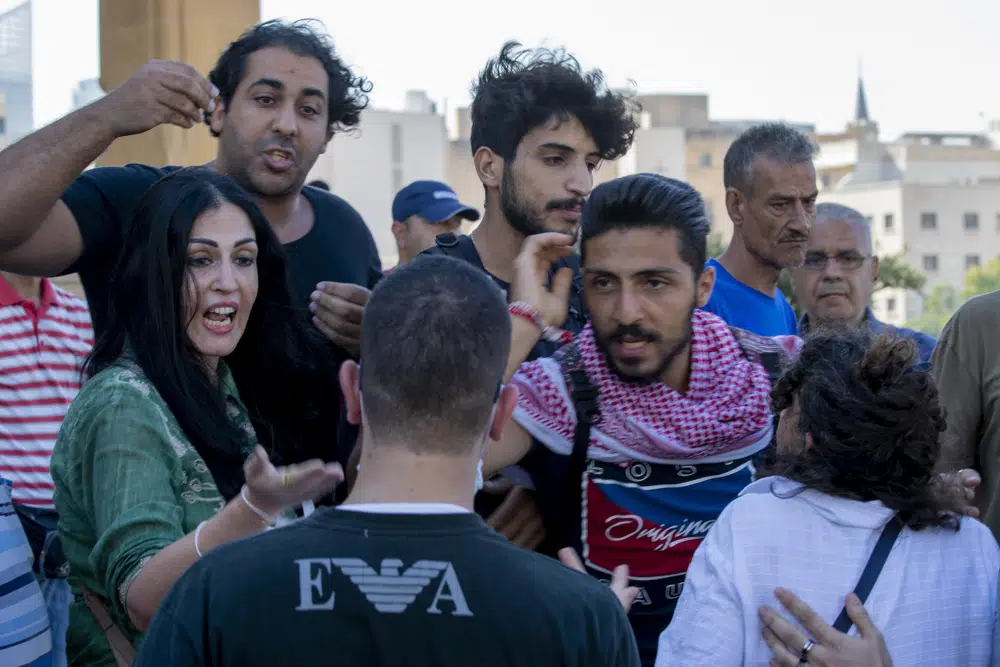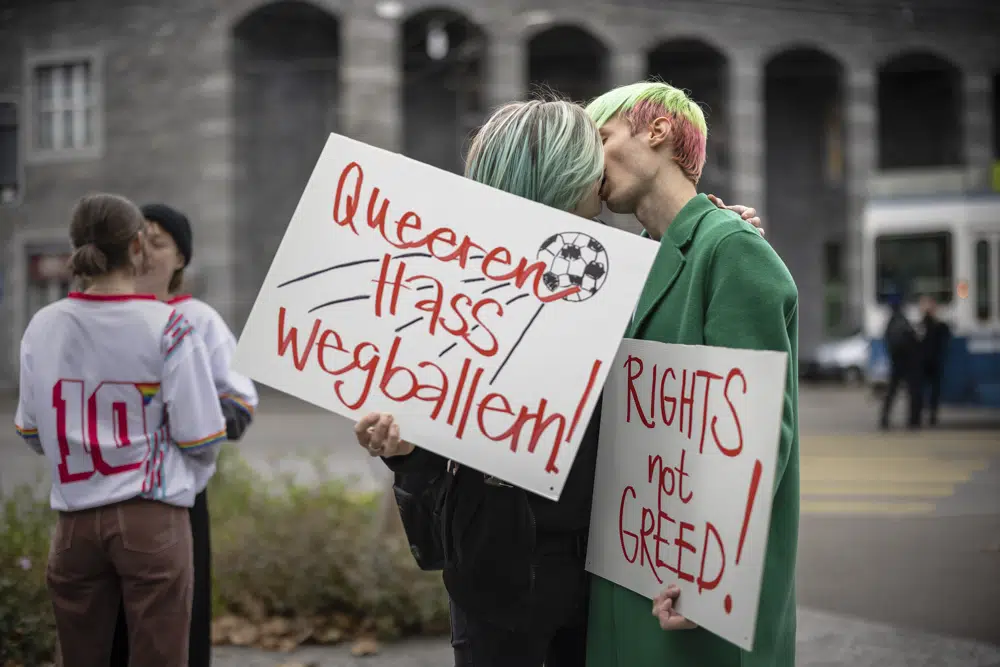YOGYAKARTA, Indonesia (AP) — On the outskirts of Yogyakarta, an Indonesian city that’s home to many universities, is a small boarding school with a mission that seems out of place in a nation with more Muslim citizens than any other. Its students are transgender women.
It is a rare oasis of LGBTQ acceptance – not only in Indonesia, but across the far-flung Muslim world. Many Muslim nations criminalize gay sex — including World Cup host Qatar. LGBTQ people routinely are rejected by their families, denounced by Islamic authorities, hounded by security forces, and limited to clandestine social lives. Appeals for change from LGBTQ-friendly nations are routinely dismissed as unwarranted outside interference.
Yogyakarta’s Al-Fatah Islamic school was founded 14 years ago by Shinta Ratri, a trans woman who struggled with self-doubts in her youth, wondering if her gender transition was sinful.
She went on to earn a bachelor’s degree in biology, then devoted herself to enabling other trans women to study Islam. Initially, there were 20 students at the school, and now about 60 – many of them middle-aged.
Among them is Y.S. Al Buchory, 55, who struggled for years to cope with lack of acceptance by people around her, but now feels at home at the school and hopes tolerance spreads through her country.
“Like a rainbow, if there are red, yellow, green colors combined, it becomes more beautiful, rather than only black and white,” she said. “We must be able to respect each other, tolerate, not interfere with each other.”
Compared to many Muslim nations, Indonesia is relatively tolerant. Scores of LGBTQ organizations operate openly, advocating for equal rights, offering counseling, liaising with religious leaders. Only one conservative province, Aceh — which practices Sharia law — explicitly criminalizes same-sex relations.
In Aceh, two men were publicly caned last year – 77 strokes each — after neighbors reported them to religious police for having sex. Earlier this year, Indonesian Vice President Ma’ruf Amin, in a speech to Muslim teachers, said LGBTQ people were engaged in “deviant behavior” that should be outlawed.
“Parliament must be demanded to make this law,” said Ma’ruf Amin, a Muslim cleric. “Ask them to ban LGBT.”
That attitude was reinforced last week, when the United States canceled a trip to Indonesia by a special envoy on LGBTQ rights after the country’s most influential Islamic group objected.
“We cannot accept guests whose purpose of coming here is to damage and mess up the noble values of our nation’s religion and culture,” said Anwar Abbas, vice chairman of the Indonesian Ulema Council.
Dédé Oetomo, founder of the LGBTQ-rights organization GAYa NUSANTARA, said acceptance of his community varies from one region of Indonesia to another. He cited a few examples of public support – such as a trans woman chosen as leader of a village council – yet said there is little hope of meaningful government support.
“We still cannot imagine if there would be a law for the protection against discrimination,” Oetomo said.
That’s the norm throughout the Muslim and Arab worlds – either government neglect or outright hostility toward LGBTQ people, said Rasha Younes, a senior researcher with Human Rights Watch who investigates anti-LGBTQ abuses in the Middle East and North Africa.
In a few countries, LGBTQ-friendly cafes have surfaced and activists have been able to organize – offering social services and, if possible, campaigning for reforms, Younes said.
“But the results are as weak as ever,” Younes said, noting that anti-LGBTQ laws remain in place and activists often face crackdowns by security forces.
“There is some solidarity and changing social attitudes,” she said. “But the onus is on the government. LGBTQ people will continue to live on the margins unless the governments repeal these laws.”
In many cases, the religious underpinnings of anti-LGBTQ attitudes are coupled with resentment of outside pressure from nations that have embraced LGBTQ inclusion. More than a dozen Muslim nations recently barred Disney’s latest animated film “Lightyear” from playing at cinemas due to inclusion of a brief kiss between a lesbian couple. In Qatar, authorities have urged visiting World Cup fans to respect the local culture — in which LGBTQ activism is taboo.
In some countries, apparent advances for LGBTQ people have been followed by pushbacks. Lebanon is an example. Over recent years, its LGBTQ community was widely seen as the most vibrant and visible in the Arab world, with advocacy for greater rights by some groups, and gay bars hosting events such as drag shows.
Yet many in the community have been reeling from a wave of hostility this year that included an Interior Ministry ban on events described as aiming to promote “sexual perversion.”
Online, some people have railed against Pride events, at times citing religious beliefs, both Muslim and Christian, to denounce LGBTQ activism. Someone posted an image of a knife slicing through a rainbow flag.
At one point, security force members showed up at the Beirut office of the LGBTQ-rights organization Helem, executive director Tarek Zeidan said.
Some LGBTQ activists called for a protest, distributing an invitation that said, “We will continue to love and to live as we wish.” But the demonstration was postponed, with organizers citing safety concerns.
The crackdown has rattled LGBTQ people already straining due to Lebanon’s economic crises, which activists say have disproportionately fueled unemployment and homelessness in vulnerable groups.
In November, activist groups reported with relief that the Interior Ministry’s ban on LGBTQ events had been suspended.
“We are on the battlefield and part of the conversation,” said Zeidan. “In Lebanon, the conversation is fiercely being debated. In other parts of the region, the conversation has been completely quenched.”
Sahar Mandour, Amnesty International’s researcher on Lebanon, elaborated.
“There is a space. We have organizations. Nightlife exists,” Mandour said. “But it’s always under negotiation, where and when. There’s no protection, but there’s existence.”
In Turkey, which is overwhelmingly Muslim, President Recep Tayyip Erdogan’s government has shown increasing intolerance toward any expression of LGBTQ rights, banning Pride marches and suppressing the display of rainbow symbols.
It’s a marked change for Erdogan, who, before taking power in 2003, said mistreatment of gay people was inhumane and called for legal protections.
A Pride march in Istanbul, which had been held since 2003 while attracting huge crowds, has been canceled since 2014. In contrast, the government recently allowed a large anti-LGBTQ rally to proceed without police interference.
The ruling party is expected to propose constitutional amendments that would protect family values from what Erdogan describes as “perverted currents.” Activists fear the amendments would curb LGBTQ rights and discourage same-sex relationships.
Among Arab nations, most explicitly outlaw gay sex, including Qatar. It has faced intense international scrutiny and criticism before and during the World Cup over rights issues, including questions on whether LGBTQ visitors would feel safe and welcome.
Other Arab countries, such as Egypt, prosecute LGBTQ people under charges of immorality or debauchery. The situation is similar in Iraq; Human Rights Watch says lack of an explicit ban on gay sex there has not protected LGBTQ people from violence and discrimination, nor from occasional charges of immorality or public indecency.

A transgender Iraqi woman who identifies as Kween B, told The Associated Press her life felt precarious, like standing in the midst of a busy highway.
“You could get smashed any second,” said Kween, who lives in the Kurdish city of Sulaymaniyah.
In her case, that has meant getting bullied as a child and suppressing her feminine identity while in high school and university. Now, at 33, she believes she would be rejected, or even physically harmed, if she came out to her family. But in recent years, she has increasingly pushed the boundaries, donning a rainbow wristband in public or wearing makeup for a party.
Earlier this year, Human Rights Watch alleged that armed groups in Iraq abduct, rape, torture and kill LGBTQ people with impunity and that the police arrest and also carry out violence against them.
Iraqi officials deny any attacks by security forces on gay people; one commander affiliated with an umbrella group of militias rejected the accusation and said violence suffered by gays was likely from their families.
For Kween, her apartment is her safe space. A few years ago, she started hosting gatherings that, at first, included a few close LGBTQ friends but has since grown. At such gatherings, she can fully express herself, donning a wig and a dress.

“We’ve got to be who we are,” she said. “If we don’t do the fight ourselves, nobody is going to do it for us.”
Looking ahead, leading LGBTQ-rights advocates salute the courage of activists trying to operate publicly in countries such as Lebanon and Tunisia. But they are not optimistic about major LGBTQ advances any time soon in most of the Arab and Muslim worlds.
“In many countries, where civil society is not allowed, where there’s complete lack of rights and free association, activism cannot be viewed in the public realm,” Younes said. “People cannot protest or express support online for LGBTQ rights, so there’s total repression of LGBTQ rights.”
Kevin Schumacher, whose current work focuses on advancing women’s rights in Afghanistan, spent seven years as Middle East and North Africa program coordinator for OutRight Action International, a global LGBTQ-rights organization.
He’s skeptical that the LGBTQ cause can rise to the forefront in the region’s numerous authoritarian-ruled countries where women and political dissidents, as well as LGBTQ people, often are repressed. He sees the current widespread anti-government protests in Iran – where homosexual acts can be punished by death – as a possible model for how change could come about.
“You can’t just talk about LGBTQ rights if the straight people are oppressed, if the women have no rights,” he said. “The discourse should be about bodily autonomy — the right over your body and decisions over your sexual rights, not specific to men, women, gay, straight.”

